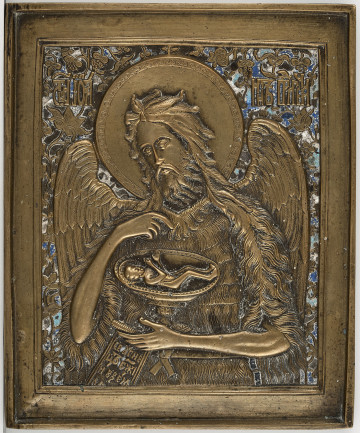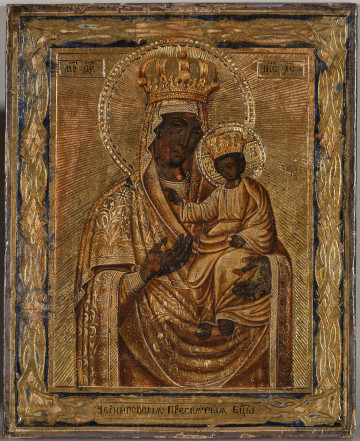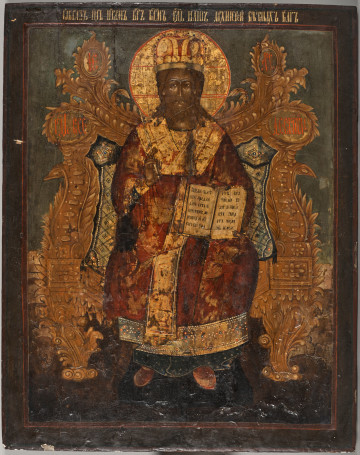
St. John the Baptist
20th century
Castle Museum in Łańcut
Part of the collection: Icons
Mother of God Hodegetria of Georgia icon, Russia, 19th c. Some of the especially revered icons of Eastern Christianity were the depictions of Mother of God Hodegetria - see S.12677MŁ. One of its variants, known as the Georgia Mother of God in the tradition of the Moscow Orthodox Church, appeared in Russia in the 17th c. After the defeat of Georgia by Abbas the Great in 1662, many of the looted objects of Christian worship went from Georgia to Persia, where they were purchased by merchants. A certain Stefan Łazariew, a manager of the Russian merchant Grzegorz Łytkin, acquired the icon of the Mother of God in this way and brought it to Jarosław in 1629. Łytkin donated it to the monastery in Krasne Gorki on the Pina river near Arkhangelsk. The painting became famous for miracles. In 1654, the icon was brought to Moscow for a change of the decorative riza. The goldsmith performing the task, Gabriel Jewdokim, prayed to the Georgia Mother of God for his terminally ill son. The boy recovered and his father commissioned the famous Moscow icon painter Simon Ushakov to copy the icon, which he then donated to the Church of the Trinity in Nikitiniki, near Moscow. In recognition of the miracles, in 1658, Tsar Alexis I Romanov and Patriarch Nikon established the day of the icon on the day of its arrival in Krasne Gorki, the 4th of September (August 22 in the Julian calendar). In 1698, it was declared that every year, the icon should be moved to Arkhangelsk, Vologda, Veliky Ustyug, and even Siberia. The Krasne Gorki monastery was shut down during the communist persecution after the 1917 revolution; it is said that the last time the original icon was seen was during a procession to Arkhangelsk in 1946, after that, it disappeared. The miraculous original and copies of the Mother of God of Georgia were decorated with valuables in the form of rizas and votive offerings, which, in newer copies, translated to using rich painted ornamentation imitating valuables, as can be seen on the displayed icon. Teresa Bagińska-Żurawska https://orcid.org/0000-0002-9243-3967
Other names
Georgian Mother of God
Dimensions
height: 33 cm, width: 25.5 cm
Object type
Icons
Technique
gilding, tempera
Material
gold, tempera, wood
Origin / acquisition method
decyzja administracyjna
Creation time / dating
Creation / finding place
Owner
Castle Museum in Łańcut
Identification number
Location / status

20th century
Castle Museum in Łańcut

19th (?) century
Castle Museum in Łańcut

1800 — 1850
Castle Museum in Łańcut
DISCOVER this TOPIC
Castle Museum in Łańcut
DISCOVER this PATH
Educational path